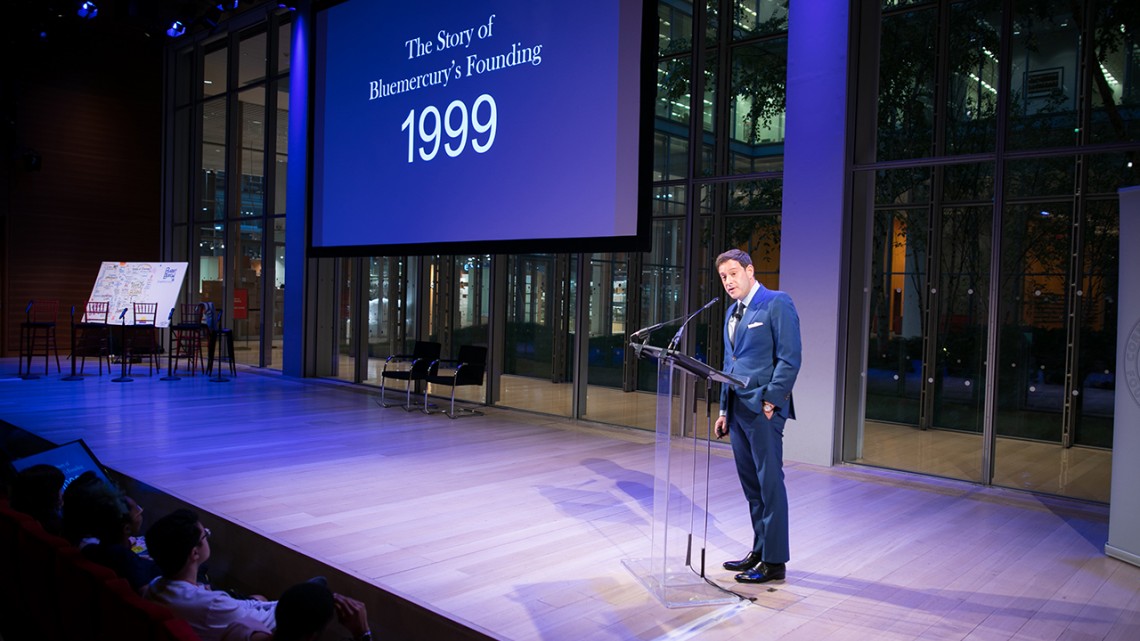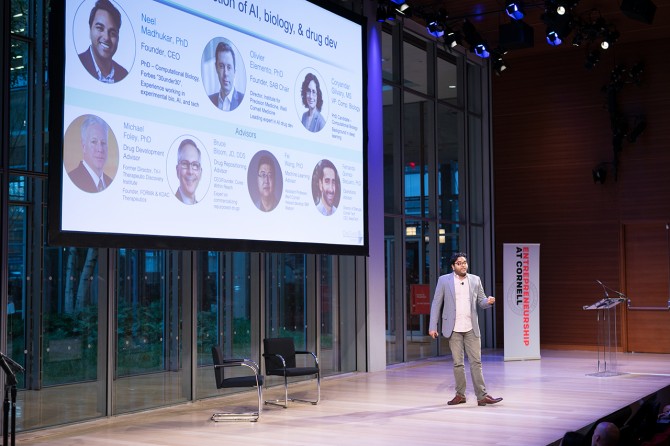
Barry Beck ’90, co-founder and chief operating officer of Bluemercury Inc., challenged the audience members to think of ways to disrupt the status quo with their business ideas.
Convergence of ideas is focus of Entrepreneurship Summit
By Kathy Hovis
The eight speakers who highlighted the 2018 Entrepreneurship at Cornell Summit in New York City Nov. 9 embodied the day’s theme: eclectic convergence. With products ranging from female Viagra to luxury cosmetics to venture capitalists who focus on cross-cultural companies, speakers focused on the importance of listening to and including diverse voices in their business.
Neel Madhukar, Ph.D. ’17, was awarded $5,000 as the winner of the Summit pitch contest for his business OneThree Biotech, which uses artificial intelligence to aid companies in developing new drugs. A computational biologist who received his degree from Weill Cornell Medicine, Madhukar’s company mines public databases and partners with pharmaceutical companies for data on compounds, diseases and targets to identify drug combinations that might be successful against various diseases.
“We’ve successfully validated more than 15 new drugs so far,” he said. The company is also helping companies who already have drugs in development in their research and testing processes, he said.
More than 500 people attended the event, including a busload of students from Ithaca and numerous New York City area alumni. Scott Belsky ’02, chief product officer for Adobe and founder of Behance, moderated the event, and Leigh Gallagher ’94, senior editor at large for Fortune, led a chat with Robert Nardelli, former chairman and CEO of Home Depot and Chrysler.
Cindy Eckert, CEO of newly restarted Sprout Pharmaceuticals, talked about her work with a company that made drugs focused on low sexual desire in males. She also talked about her decision to sell that company to take on development of the drug for women, although she knew the road to FDA approval would be steeper than it had been for the male version.
“I’ve learned that you should not accept narratives that impede progress,” she said, detailing the painstaking process of trials, meetings with women’s groups and 1 million pages of data she amassed in the approvals process.
Although the FDA initially denied the drug, her company disputed that finding and worked with 10 women’s organizations that demanded a meeting and a conversation with the agency. The drug was eventually approved, and Eckert sold the company for $1 billion.
“You need to be unapologetic in your mission,” she said.
When she discovered that only 2 percent of venture capital was going to women, she founded The Pink Ceiling to invest in female-owned companies.
Another investor at the event, Marlon Nichols, MBA ’11, spoke of his desire to support companies that target underserved communities and populations. One of his investments, Ready Responders, connects off-duty firefighters and EMTs with people in need of emergency help in urban communities where emergency responders are lacking. Another firm, Catalyte, helps tech companies discover untapped computer science talent among students at community colleges or in other settings.
“There’s lots of untapped value in underserved communities,” he said. “We just need to pull back the covers and discover it.”
Barry Beck ’90, co-founder and chief operating officer of Bluemercury, challenged the audience members to think of ways to disrupt the status quo with their business ideas. By the time Beck came to Cornell, he said he had already started three companies and founded a fourth in his dorm room.
“All great entrepreneurs are riding some great wave,” he said, adding that the wave for him happened in 1999 when he noticed that free-standing cosmetics stores kept products behind glass cases “and the staff were snobby,” Beck said. He created stores with a “friendly, neighborhood” vibe, where customers were offered free trial sizes, and staff developed relationships and offered professional advice.
The concept caught on, and by 2006 the company had created its own private label brand. Today there are 200 Bluemercury stores with 2,000 employees. Macy’s bought the company in 2015.
Beck also encouraged entrepreneurs to find a good support team – not only for their company but for their personal lives – and to continue to look for ways to innovate and change direction if needed.
Kathy Hovis is a writer for Entrepreneurship at Cornell.
Media Contact
Get Cornell news delivered right to your inbox.
Subscribe


